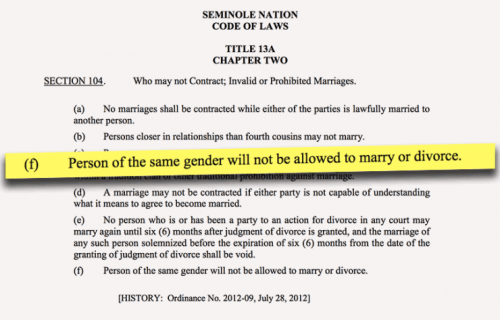Alray Nelson lives in one of the last places in America where gay marriage isn’t legal.
By Jorge Rivas, Fusion
He’s a member of the Navajo nation, the largest Native American reservation, whose territory spans three states in which same-sex marriage is now the law of the land.
But the Supreme Court’s ruling last month that declared the Fourteenth Amendment requires all states to issue marriage licenses to same-sex couples has no immediate legal impact on Nelson, the Navajo, or any of the 566 federally-recognized tribes in the United States.
Just like the 50 states had different positions on gay marriage before the Court stepped in, the 566 tribes have a variety of different stances on same-sex unions.
At least 11 tribes have created laws that either prohibit same-sex marriages or define marriage as between a man and a woman, according to an analysis by the Associated Press. About 12 have developed laws that approve and recognize same sex marriage, according to the New York-based gay-rights group Freedom to Marry. Many others stay silent on the issue or follow the lead of their surrounding states.
And then there’s the Seminole Nation of Oklahoma, which has a law that states a “person of the same gender will not be allowed to marry or divorce.”

The second most populous tribe, the Oklahoma-based Cherokee Nation, passed its law banning gay marriage in 2004.
The Navajo, who count 300,000 members and to whom smaller tribes often look for direction, passed a law in 2005 explicitly banning gay marriage. It followed in the footsteps of the U.S. Defense of Marriage Act, the federal law recognizing marriage as between a man and a woman that was signed by Bill Clinton in 1996, according to Native American LGBT advocates and historians.
But Nelson, 29, says times are changing on reservations, too.
“Now there’s Navajo couples that are becoming more vocal, and we’re seeing transgender youth also talking about their rights,” he told Fusion in a telephone interview.
He said he plans to appeal to his tribe’s traditional notions of respect and fairness to help change hearts and minds.
“There were same-sex couples from our creation story all the way to today. Those relationships were there, they were recognized, and they had every right to be productive members of our community,” Nelson said.
“If they repeal the [Diné Marriage Act] it brings it back to what our traditional values used to be. They’re using the whites man’s language, a foreign way of speaking, to redefine something that was already sacred and defined, we didn’t need to redefine it at all,” he said.
Historians say many Native Americans have embraced more fluid notions of gender and sexuality than the current gay-marriage bans might suggest.
“There is overwhelming evidence for the historic and cultural presence of multiple gender roles and same-sex relations among most if not all Native North Americans, including the Cherokee, and that they historically shared in the institution of marriage,” said Doctor Brian Gilley, an anthropology professor at the University of Vermont, in a 2005 brief submitted in a Cherokee court case after tribal leaders tried to invalidate a marriage license to a lesbian couple.
The highest Cherokee Court ultimately ruled that the two women couldkeep their marriage license.

Alray Nelson, left, and his partner, Brennen Yonnie, are leading the fight to get the Navajo Nation to recognize gay marriage.
For the last 16 months Nelson was the deputy manager for former Navajo Nation President Joe Shirley, Jr.’s re-election campaign. The candidate lost after a long contested election.
Nelson is also reaching out to the broader community to change people’s views culturally.
“When we talk about discrimination in regards to taking away someone’s rights, Navajo people get that,” he said. “They get it because they’ve dealt with decades of assimilation policy and continue to deal with those issues. So when a certain segment of the community feels left out and aren’t treated with respect and fairness, Navajos understand that and they get that fight.”
The office of Navajo Nation president Ben Shelly did not respond to requests to be interviewed for this story.
There are other significant issues affecting the LGBT Navajo community. LGBT bullying and teen suicides are high, and the Navajo Nation has seen an unprecedented spike in new HIV diagnoses.
But Nelson said starting with gay marriage can help bring attention to the other issues.
“The Diné Marriage Act is the only law in the books that directly discriminates against the Navajo LGBT community,” Nelson said.


